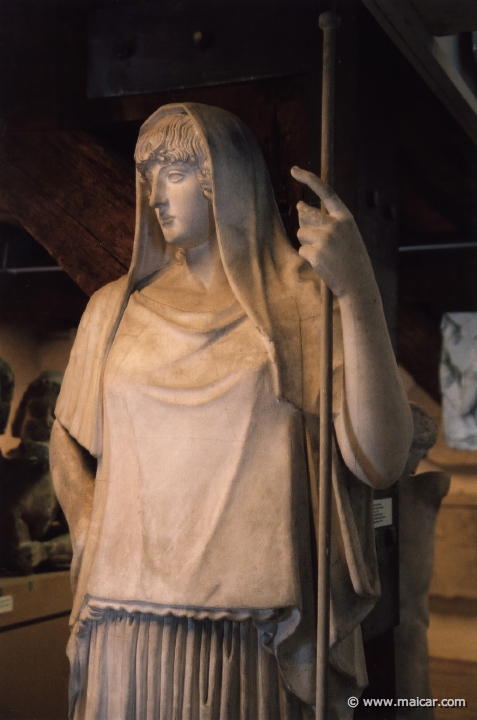|

|
8736: Hestia Giustiniani. Graesk klassisk ca 470 f. Kr. (Rom kopi) Rom, Villa Albani (Royal Cast Collection, Copenhagen).
|
|
"Shall we, then, begin with Hestia, according to custom?" (Socrates. Plato, Cratylus 401b).
"Zeus, driving a winged chariot, goes first, arranging all things and caring for all things. He is followed by an army of gods and spirits, arrayed in eleven squadrons; Hestia alone remains in the house of the gods." (Socrates. Plato, Phaedrus 246e).
"By addressing Hestia first, I might, thanks to her, crush an adversary." (Philocleon. Aristophanes, Wasps 846).
"Hestia, you who tend the holy house of the lord Apollo, the Far-shooter, with soft oil dripping ever from your locks, come now into this house, come, having one mind with Zeus the all-wise, draw near, and withal bestow grace upon my song." (Homeric Hymn to Hestia 24).
|
|
Hestia is Hearth, the goddess who never leaves home, Olympus, and never takes part in the struggles of men or gods. Some have said that the name of Hestia is one of those names of deities which was not known to the ancient Egyptians. However, Hestia, who some have considered the chief of the goddesses, is the first born of the OLYMPIANS, and was propitiated even by the Scythians, who called her Tabiti. Hestia, who discovered how to build houses, extends her power over altars, hearths, and States, and she was given the protection of the town hall. Therefore, all prayers and sacrifices end with this goddess, because she is the guardian of the innermost things.
She is a virgin goddess, and not liking Aphrodite's works, she can never be ensnared by the goddess of love. Both Poseidon and Apollo wished to marry her, but she refused them, and touching Zeus' head, she swore an oath that she would be a maiden all her days. So instead of marriage, Zeus granted that her place should be in the very midst of the house. And for that reason mortals do not hold banquet without offering to Hestia both first and last, and so was done in Elis too, because there they sacrificed first to Hestia, and secondly to Zeus.
|